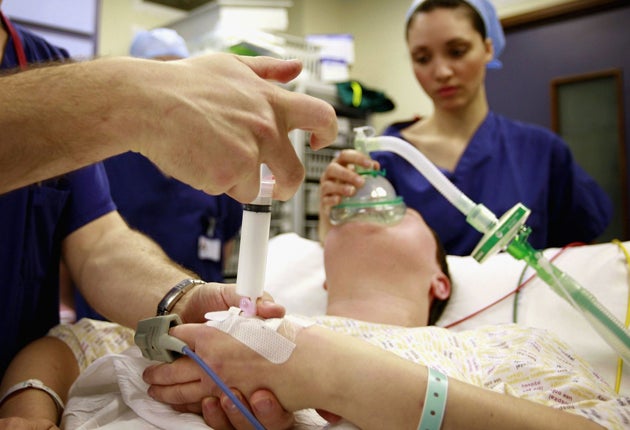Meet the new nurses on £54,000
Why has the idea that nurses should be better qualified sparked such a fierce debate?

Are British nurses getting "too posh to wash"? That was the question that got health minister and former nurse Ann Keen huffing and puffing last week. The debate was sparked after the government announced that all nurses, who are now able to enter the profession with a diploma, will have to take a three-year degree before they begin practice by 2013.
"Comments like this are a form of snobbery, often from people who don't want to acknowledge the great work in the profession," says Keen, "Nursing is one of the hardest jobs out there – physically, mentally and emotionally – and nurses are proud of all the work they do. It's an insult to belittle their role in this way."
Like it or not, nursing no longer fits our nostalgic stereotypes. The image of the bustling rosy-cheeked lady with the bedpan has long passed. In its place, a new generation of nurses is taking on greater responsibility in a healthcare system that is offering ever more sophisticated and technical treatment. The introduction of degrees is just the latest step in nursing's steady transition from vocation to profession.
"The public doesn't realise what levels they (nurses) are practising at," says Keen. "They're expecting to see a doctor and they see a nurse. But they are always so pleased with the care they receive – nurses have a different skill of communication."
Ciaran Newell is a classic example of a modern-day "super nurse". A consultant in the profession with more than 25 years experience, he now works for Dorset Healthcare NHS Foundation Trust and earns £54,000. A specialist in eating disorders, his daily routine includes lecturing to MA students in psychology, training GPs and making presentations at international conferences. He carries a laptop, and is more likely to wear a suit than a white coat.
"The stereotype of the nurse as the doctor's handmaid has changed beyond recognition since I qualified," says Newell. "But people are still very surprised to hear I'm a nurse, particularly as I've got a doctorate. People tend to assume that nursing is second best, that you did it because you couldn't get into medical school, but nurses have huge influence now. I can't remember a time when nursing had so many opportunities."
Since he became a nurse, Newell has obtained a degree in psychology, a PhD specialising in eating disorders and diplomas in management and CBT, much of which was funded by the NHS. But he denies that this education has left him "too clever to care" – 50 per cent of his time is still spent on the frontline. "I still sit with patients when they're crying, meet their parents and hold their hands," he says. "My education and training helps me to do practical work with more sensitivity and understanding."
Despite coming up through a three-year apprenticeship programme, Newell is in favour of the new degree system. "Obviously I have a fondness for the model I went through, but I'm not sure it would have prepared me for the way things work now. Nurses need to be more autonomous, and a degree is good preparation for that. The challenge will be to ensure that communication and caring is part of that. We can't think of this as a traditional degree like physics – it still needs to have a practical basis."
Newell may earn £54,000 a year for his work, but consultant nurses can earn up to £95,000 – that is 44 more than the starting salary of your average GP, and over 30 per cent more than an MP. Although this is a long way off nurses' current starting salary of £20,000, nursing at any level must be an attractive option in the middle of a recession. This year, applications for nursing training rose by 17 per cent.
But nursing minister Ann Keen thinks that we "still don't reward nurses enough" and that the extra investment required to train them to degree level is more than justified.
"Treatment has advanced massively since I was training in the early Seventies," she says. "Cancer used to be a death sentence, now it's a long-term condition. Nurses have to be more technically and emotionally competent to deal with these changes. We have to think of the real economic value their work brings to the community."
There is a long way to go. With 400,000 nurses working for the NHS, they make up the largest workforce in the healthcare profession. But in 2009, only 32 per cent of new NHS nurses had degrees. Getting all new entrants up to speed by 2013 will be one of the biggest challenges of medical education in the NHS's history.
Join our commenting forum
Join thought-provoking conversations, follow other Independent readers and see their replies
Comments
Bookmark popover
Removed from bookmarks